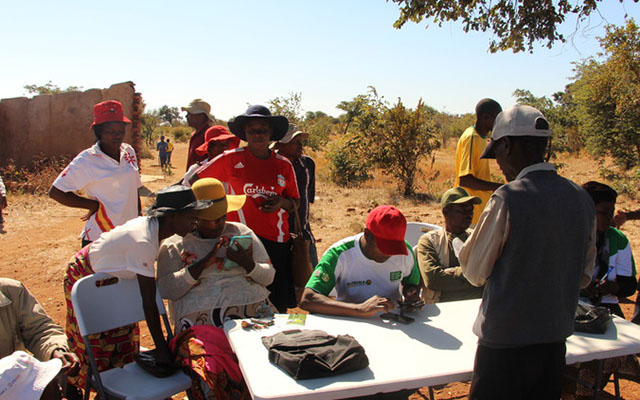Bridging the farmer, extension worker gap

Leroy Dzenga Features Writer
Extension worker shortage has been cited as a challenge bedevilling Zimbabwean farmers, especially those operating in communal areas.
This has resulted in poor agronomy methods in some cases where farmers make do with the little information they have or improvise. Many have been trying out the same methods to no new success in fact it has ended tragically in some cases.
Recently, there was an outcry among farmers who were sent back by the Grain Marketing Board over moisture content in their maize. Some of these things could have been avoided had the information been easily availed to them and there is a way around the challenge.
Most households have mobile telephone devices, either smartphones or feature phones usually referred to as “mbudzi” and they can bridge the distance between the extension officer and farmer.
Farmers are starting to warm up to the idea of having information even in the absence of human extension officers. Mr Richard Jorry (71) a farmer in Dera area in Gokwe South has been using an application called Kurima Mari to furnish his information needs.
“A few months ago, a lady introduced me to this application and she told me I can get basic information about farming on it. Since then I have been getting advice on a lot of things,” he said.
Coordinated WhatsApp groups have also helped him relay his immediate concerns to an extension worker. “Besides the material that is provided in the application which includes farming books, podcasts and video content. There is a platform which farmers can interact and share ideas,” Mr Jorry said
He says he is learning about land preparation and understanding that farming is a process that continues throughout the year. Armed with the information from the Kurima Mari application, the senior citizen believes he is ready for the next farming season. Even those who do not have sophisticated smartphones can still enjoy the benefits of electronic extension.
The department for International Development from the United Kingdom (DFID), Welthungerhilfe, and The Ministry of Agriculture, Mechanisation and Irrigation Development through Agritex have brought in a farming application and SMS updates.
The idea is running under the Extension and Training for Rural Agriculture (EXTRA) project.
There is hope among experts that the emergence of technology will have two effects, increasing mobile penetration in rural areas as well as eradicating a one-dimensional approach to farming.
Technology expert, Nigel Gambanga who is the Information Technology Coordinator in the EXTRA e-extension project said the idea was not to replace extension officers but to complement their efforts.
“The information disbursed through the application and SMS platforms is from the Ministry of Agriculture, Mechanisation and Irrigation Development,” Gambanga said.
His time on the ground helping farmers with education on e- extension and installations has given him insight on the need for technology solutions in farming.
Agritex extension officers were facing challenges in accessing all farmers sometimes owing to transport constraints. “Some of the extension officers do not have motorcycles and they have to cover a lot of ground in servicing farmers. Now people can get information on key areas like cattle fattening, crop rotation and field preparation through phones,” he said.
Farmers are appreciating the way that they have been able to get information on the go without calling an extension officer. Smartphone penetration hasn’t been as desirable estimates are pegged at 25 percent and the situation on the ground has been testament.
“We had considered the challenges before rolling out, this is why we brought up the SMS alerts that get to farmers,” said Gambanga. However, there is still need for awareness as some rural dwellers do not understand that there is more to a mobile phone than phone calls and WhatsApp.
Even Agritex workers are warming up to the electronic wave as it cuts the strenuous work in half increasing efficiency in their operations. They are not moved by assumptions that technology is seeking to replace their relevance in particular reference to the Kurima Mari application and SMS updates.
Areas covered include Silobela, rural Gokwe and Shurugwi. Mr John Ngwenya the agricultural extension officer Gokwe South District said there is need to incorporate ICT in extension work.
“In this Kurima application you find that we have soft copies of textbooks which are availed to the farmers in a way that is not expensive. The extension officer should be there to explain concepts to the farmer not to introduce them to it,” he said.
According to Ngwenya, new generation farmers have a high literacy level, they have been embracing the application. Young people are venturing into farming; the calibre of the farmer has changed.
“In cases of emergencies, the farmer can alert us to a problem they are facing at their farm and we can then load it to the app and communicate with the rest of the farming community so that they respond accordingly,” he said.
There should be constant connection between the farmers and the extension officers even beyond the farming periods. One of the key partners in the project Welthungerhilfe say they would like to empower farmers so that they do not become excessively reliant on donor money.
Tawanda Hove the Welthungerhilfe ICT and communications officer said they are working on improving farmer self-sustenance. “Our first strategy is to promote usage of technology in agriculture through the application. We have started training Ministry of Agriculture, Mechanisation and Irrigation Development as well as Agritex officers in wards,” he said.
One of the challenges has been network for those who farmers who use feature phones. “Kurima Mari application works offline but those who get SMS updates face a challenge in some parts as the function is heavily reliant on network,” Hove said.
So far, they have trained about 4 850 people in Midlands with an aim of spreading their activities throughout the whole country. “Farmers for so long thought that smartphones are luxury tools and there is need for education to enlighten them on the possibilities locked within their gadgets”, said Hove.
There is hope among those involved in the project that the implementation of digital strategies in farming will increase this year`s yields.
Increased availability of information is expected to improve farming methods and consequently yields, statistics will be availed after this year`s farming season to measure its impact.
- Feedback: [email protected]








Comments